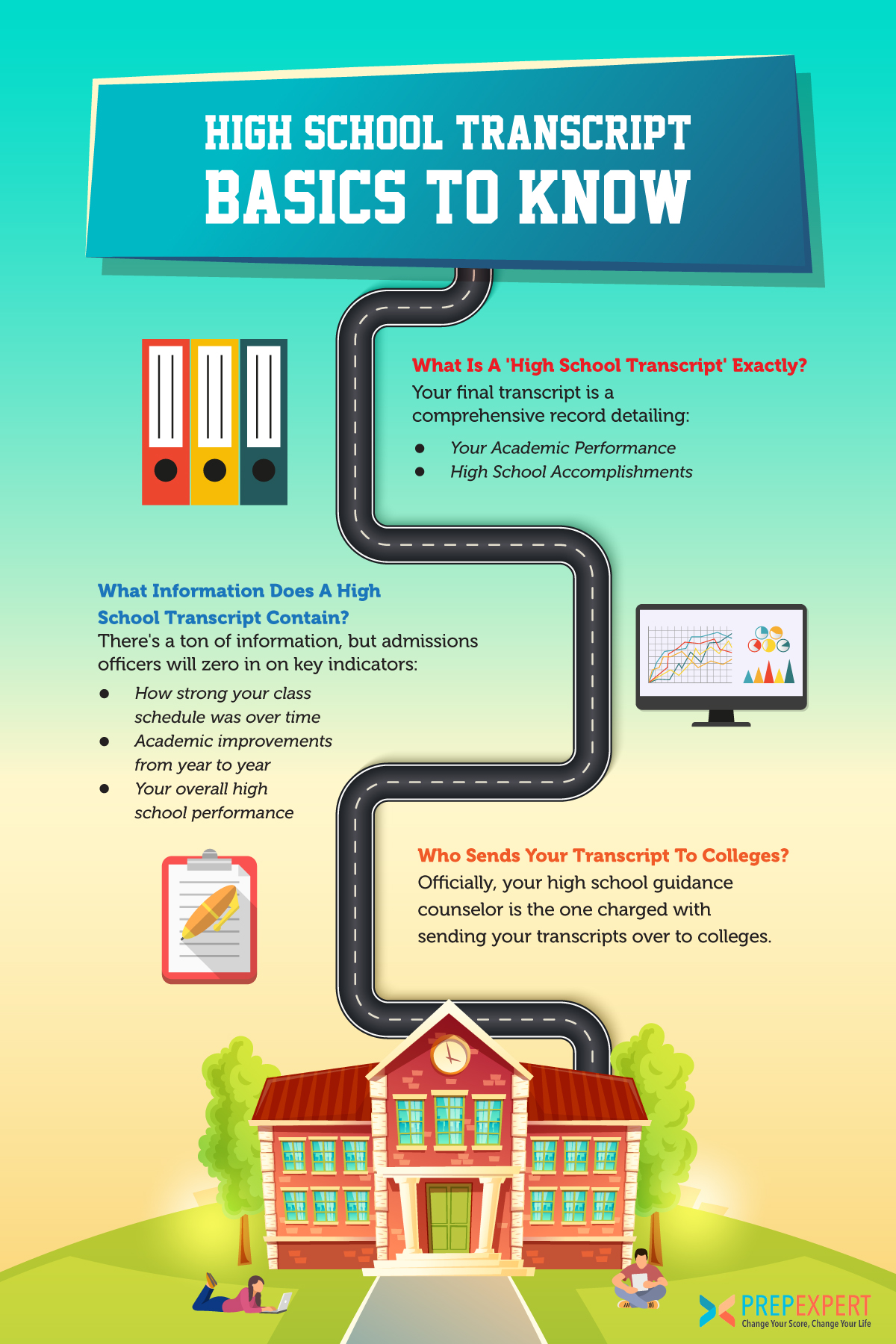High School Transcript Basics To Know
Every college and university will request your high school transcript as part of the application process. Everyone throws that term around but do you know what a ‘high school transcript’ actually is?
So you understand what you’re asking for, here are the basics of what a high school transcript is, how to request them, and how they’re used by colleges and universities.
Take a minute today and learn about our available SAT prep and ACT prep courses today.
What Is A ‘High School Transcript’ Exactly?
This is your last high school report card.
Your final transcript is a comprehensive record detailing:
- Your Academic Performance
- High School Accomplishments
In short, your high school transcript provides admissions officers a snapshot of what you did in high school and how hard you worked during those four years. It isn’t the final factor on whether you’re admitted or not, but it plays a significant role.
What Information Does A High School Transcript Contain?
There’s a ton of information, but admissions officers will zero in on key indicators.
Basic examples of included information are:
- Class Listings (from freshman year through senior year)
- Grades Received In Every Class
- Class Timeline
- Your GPA (both weighted and unweighted)
- Class Rank (if your school does them)
- Attendance Record
- Serious Disciplinary Actions
Your transcript may also list your standardized test scores and awards or honors you’ve received, but that’s not guaranteed. Your transcript should showcase:
- How strong your class schedule was over time
- Academic improvements from year to year
- Your overall high school performance
Colleges use this information to try and predict how well you’ll adapt and perform in college itself.
Who Sends Your Transcript To Colleges?
In short, sending it isn’t your problem.
Officially, your high school guidance counselor is the one charged with sending your transcripts over to colleges. You, as a student or parent, can’t provide the information because it must be an “official transcript” document sent by the high school itself.
These documents are verified and can have official markings from your school with a designation like:
- Stamp
- Official Seal
- School Letterhead
Depending on the schools you apply to, your counselor may also need to send a mid-year and final report of your senior-year grades.
This material is usually requested by colleges that want to ensure you’ve kept your grades up after receiving your acceptance letters. Long story short? Don’t slack off so close to the end.
How Are Transcripts Sent?
Every school is different but there’s a basic process for most high schools.
Here’s a rough flow:
- Your guidance counselor will host a presentation during junior year explaining the transcript process
- If that doesn’t happen, then meet with your counselor and ask about the school’s procedure for transcript requests
Common steps include:
- Filling out a high school-provided request form
- Going through a third-party site (which carries a fee)
You may, or may not, have to pay a small fee per transcript request but don’t worry about that too much yet. The best thing you can first do is meet with your counselor and provide a list of the colleges you’ll need to send transcripts to soon.
How Do Colleges Evaluate Transcripts?
Colleges look at both quantity and quality on your transcript.
The biggest thing to know is that colleges look at transcripts in context. Straight A’s alone don’t mean everything in their eyes. What they will pay close attention to is how difficult your school’s curriculum is, in relation to other high schools.
They will look at the difficulty levels of classes you took, and assess your grades accordingly. Let’s say that during your senior year, you took 2 AP or honors courses and received a B and C in them.
Depending on what those classes were, you may not receive any adverse reaction because they understand how hard those classes are to do well in. Admissions officials WANT to see you challenge yourself and stretch academically.
You’ll receive more credit for doing ok in harder advanced level-classes, than coasting through entry-level ones with easy A’s. Moreover, they’ll look and see if you consistently earned good grades over those four years, or if you struggled at first and then improved over time.
For more test strategy, college admissions, and scholarship application tips sign up for our FREE class happening right now!
Written by Todd Marcus
More from Todd Marcus

ACT Reading Passage Types | What To Expect
Be ready for the ACT Reading section by knowing the kinds of things you'll be reading. Here are the ACT…

Taking The ACT Junior Year
If you're ambitious and want to give yourself plenty of time for score improvement, then consider taking the ACT junior…

ACT 2020 Score Release Dates
Here then are the ACT 2020 score release dates to plan around, as well as, the different kinds of available…
